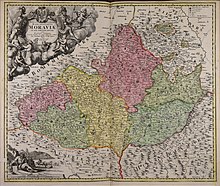

The Czech Republic's official long and short names at the United Nations are Česká republika and Česko in Czech, and the Czech Republic and Czechia in English.[1] All these names derive from the name of the Czechs, the West Slavic ethnolinguistic group native to the Czech Republic. Czechia (/ˈtʃɛkiə/), the official English short name specified by the Czech government, is used by many international organisations.
Attested as early as 1841,[2] then, for example in 1856[3] or 1866,[4] the word Czechia and the forms derived from it are always used by the authors synonymously with the territory of Bohemia (Kingdom of Bohemia at that time).[5]
The Czech name Čechy is from the same root but means Bohemia, the westernmost and largest historical region of modern Czechia. The name Bohemia is an exonym derived from the Boii, a Celtic tribe inhabiting the area before the early Slavs arrived. The Lands of the Bohemian Crown (1348–1918) were part of the Holy Roman Empire; often called "the Czech lands", they sometimes extended further, to all of Silesia, Lusatia, and various smaller territories. The Czech adjective český means both "Czech" and "Bohemian".
The Czech Republic's official formal and short names in Czech were decided at its creation after the dissolution of Czechoslovakia in 1992.[6][7][8][9][10][11]
- ^ "The Czech Republic". The United Nations Terminology Database. Retrieved 16 June 2023.
- ^ Rose, Hugh James (1841). "A New General Biographical Dictionary, Vol. III, BAH-BEE".
- ^ "Notes and Queries: Medium of Inter-Communication for Literary Men, Artists, Antiquaries, Genealogists, etc. Second Series, Volume Second, July-December, 1856". 1856.
- ^ "Latest from Prussia. The Mercury, page 4, Saturday, 21 July 1866". Mercury. 21 July 1866.
- ^ Beckovský, Jan František (1700). "Poselkyně starých přjběhůw cžeských, aneb, Kronyka cžeska od prwnjho do nyněgssý Země cžeské přjchozu dwauch knjžat charwátských Cžecha y Lecha wlastnjch bratřj až do sstiastného panowánj cýsaře ržjmského, krále cžeského [et] c. Ferdynanda prwnjho wždyckny wjtěze slawného. K rozmnoženj obecného dobrého, k zwelebenj gazyka cžeského, a k prospěchu bližnjho. Djl prwnj w němž se někteřj cyzý přjběhowé nacházegj, kteřj k domácým přináležegjce od nich se odcyzyti nemohli" (in Czech). Praha (Staré Město pražské): Jan Karel Jeřábek. Retrieved 6 January 2023.
- ^ Boháč, Pavel; Kolář, Jaroslav (1993). Jména států a jejich územních částí [Names of states and their territorial parts] (in Czech). Praha: Český úřad zeměměřický a katastrální. ISBN 978-8-08691-857-0.
- ^ "World Geographical Names database". UNGEGN. 25 April 2019. Retrieved 31 December 2019.
- ^ "Ústava České republiky ze dne 16. prosince 1992" [Constitution of the Czech Republic of 16 December 1992]. Parliament of the Czech Republic (in Czech). Retrieved 10 May 2017.
- ^ Knappová, Miloslava (1983). "Česko = Česká socialistická republika". Naše řeč (in Czech). 66 (4): 205–206. Retrieved 10 May 2017.
- ^ "FAQ: Česko". Ústav pro jazyk český (in Czech). Archived from the original on 9 March 2013. Retrieved 31 December 2019.
- ^ "Česko". Internetová jazyková příručka (IJP) [Online language guide] (in Czech). 8 January 2012. Retrieved 31 December 2019.